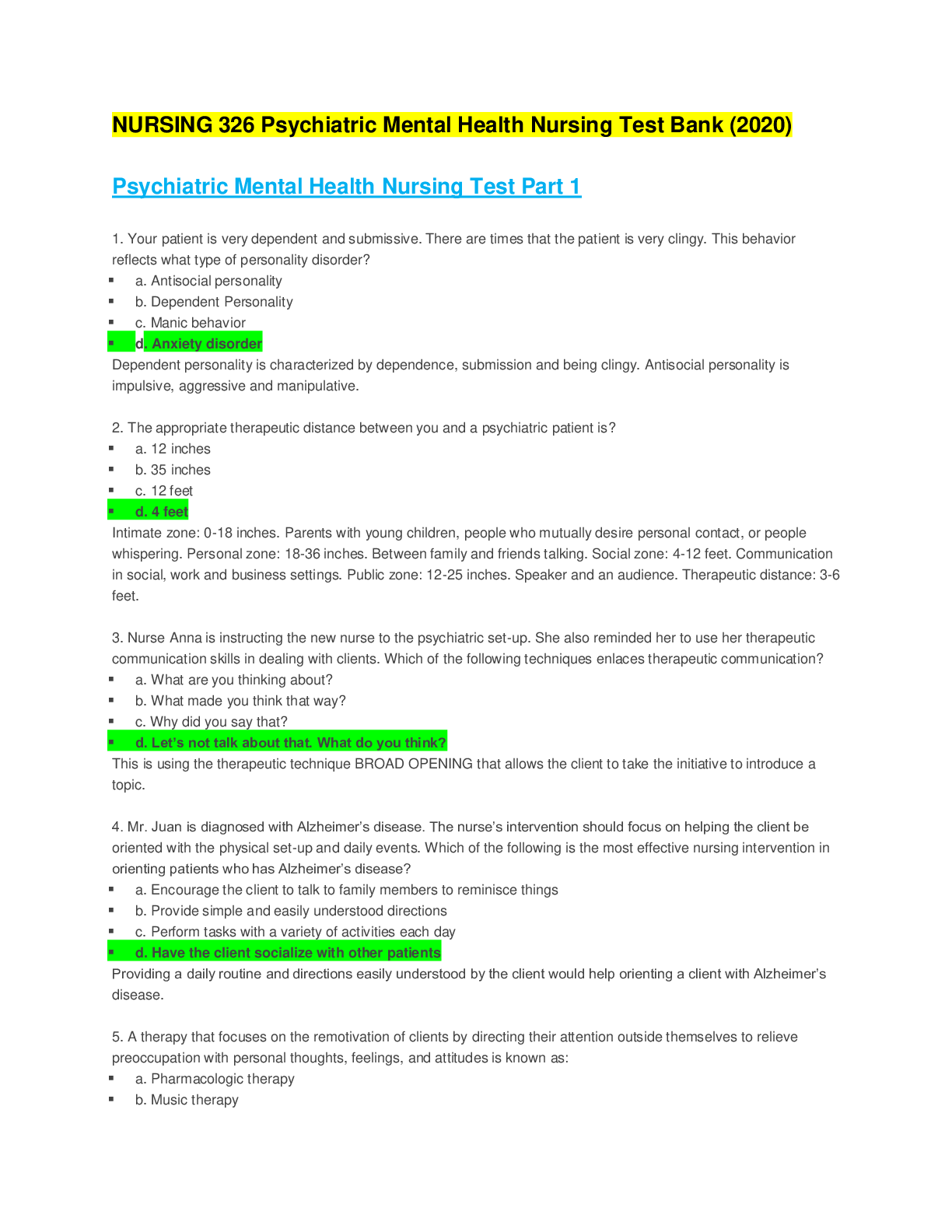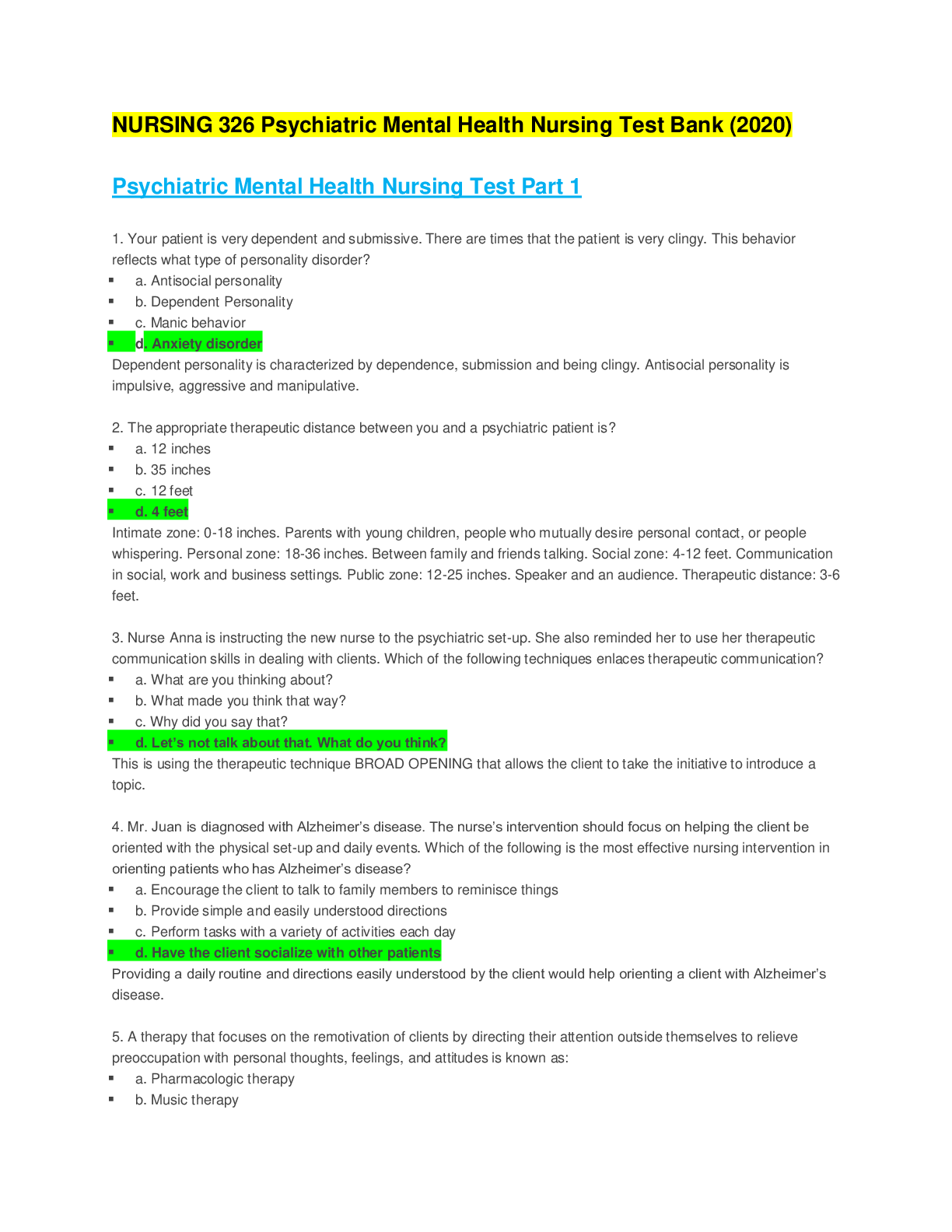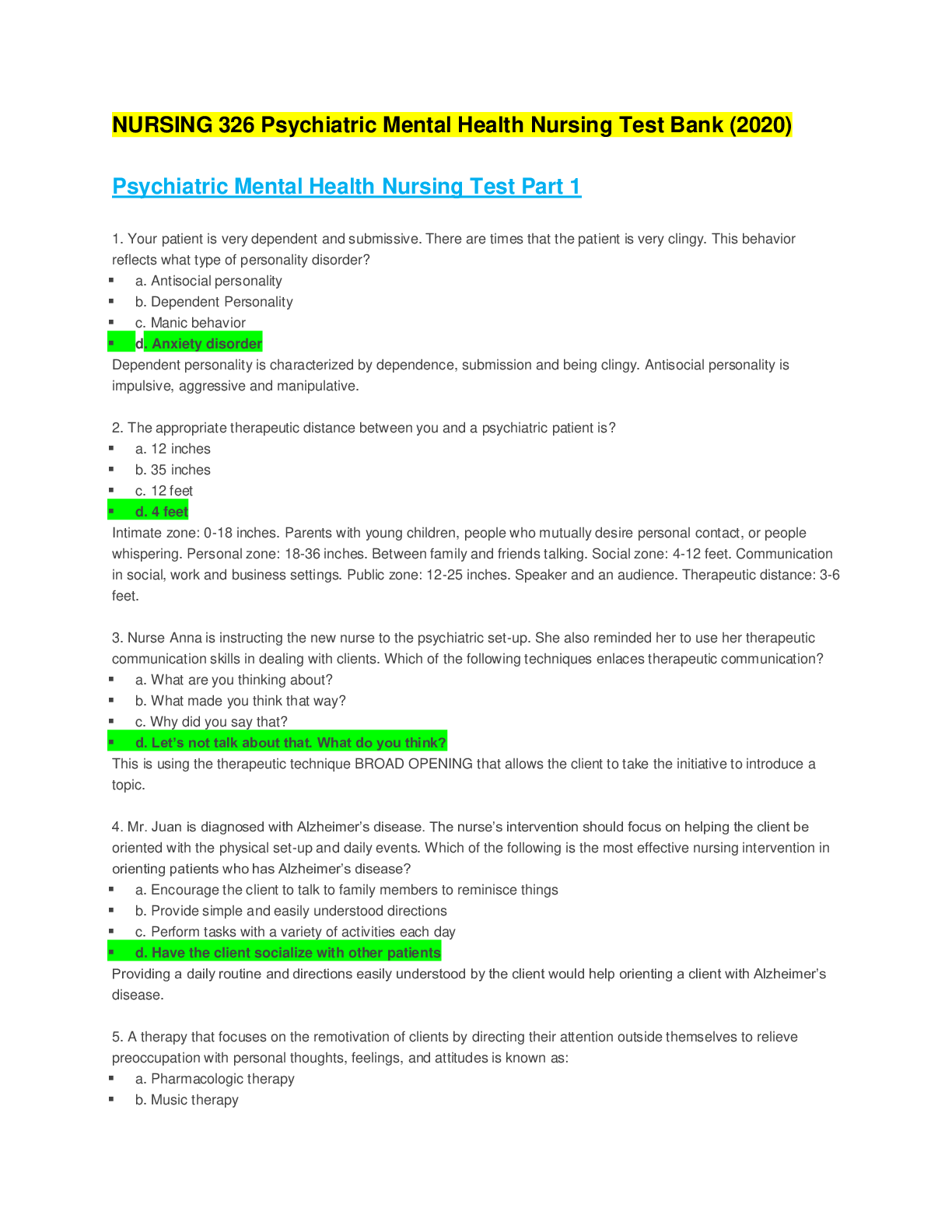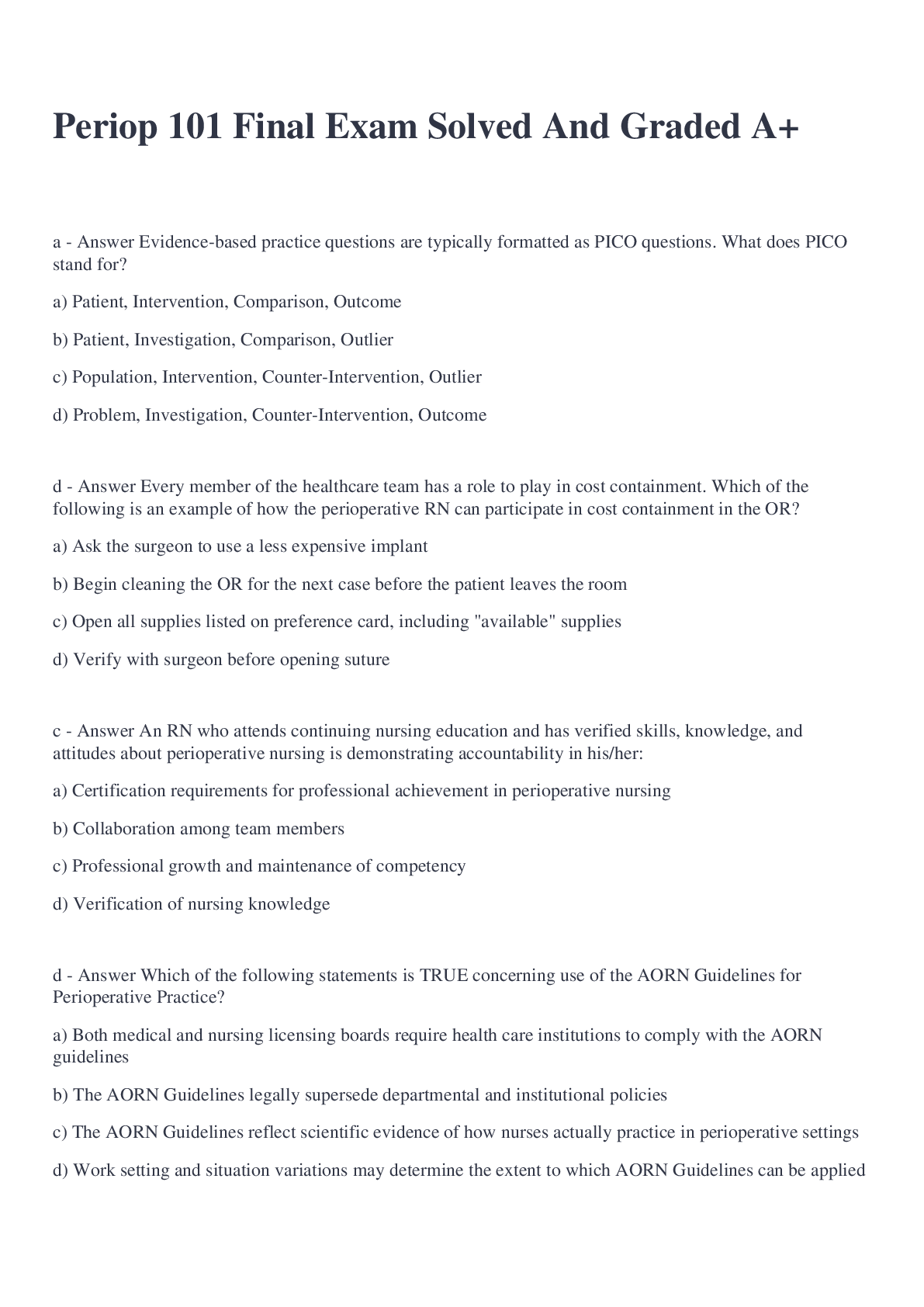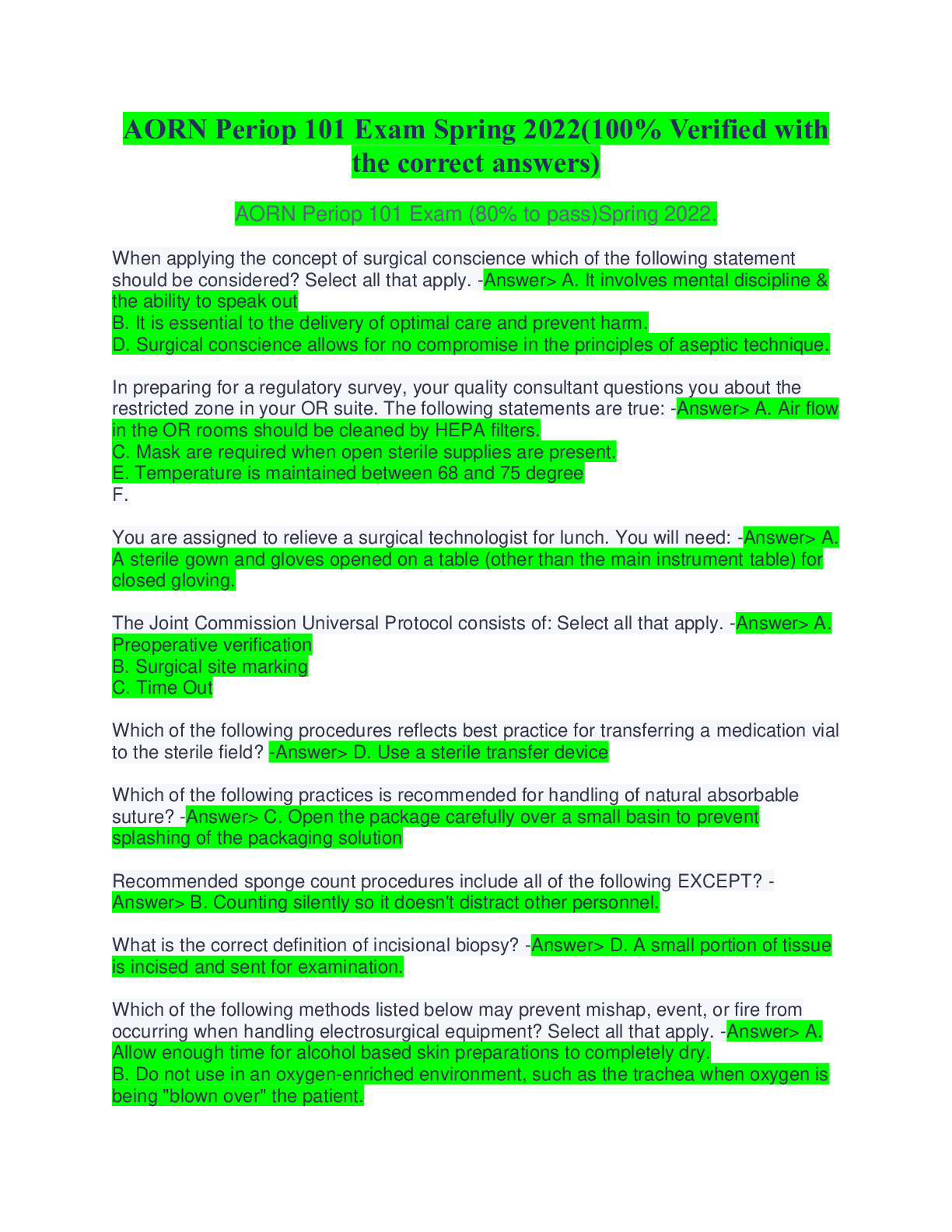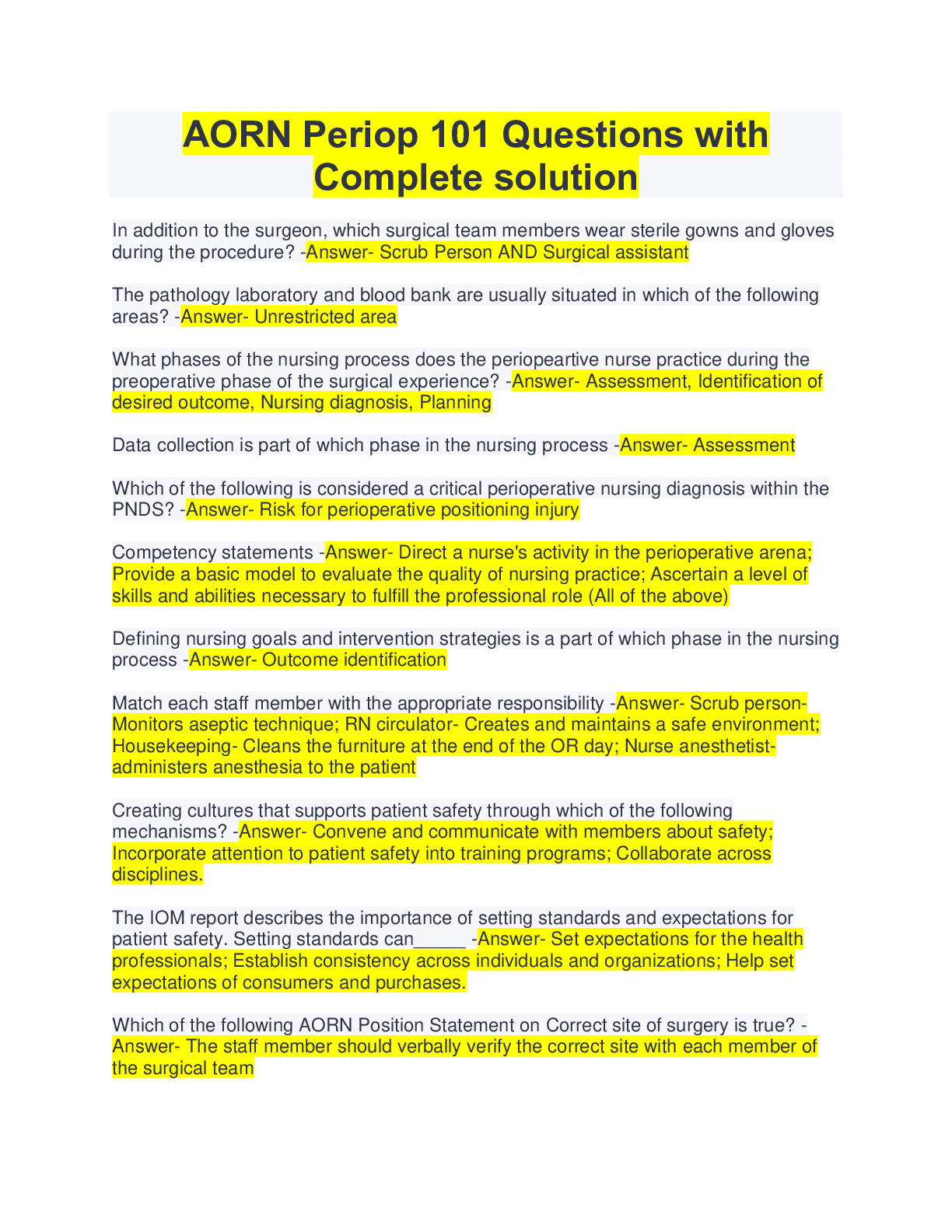*NURSING > QUESTIONS & ANSWERS > NURSING 326 : Psychiatric Mental Health Nursing Test Part 2 (Latest Complete Solutions 2019/2020) Al (All)
NURSING 326 : Psychiatric Mental Health Nursing Test Part 2 (Latest Complete Solutions 2019/2020) All Answers (Detailed) Correct.
Document Content and Description Below
Psychiatric Mental Health Nursing Test Part 2 1. Nurse Renalyn discovers that a male client with obsessive-compulsive disorder (OCD) is attempting to resist the compulsion. Based on this findi... ng, the nurse should assess the client for: a. Feelings of failure b. Depression c. Excessive fear d. Increased anxiety 2. A female client comes to the emergency department while experiencing a panic attack. Nurse Jonathan can best respond to a client having a panic attack by: a. Staying with the client until the attack subsides b. Telling the client everything is under control c. Telling the client to lie down and rest d. Talking continually to the client by explaining what is happening 3. Nurse Krishna notices that a female client with obsessive-compulsive disorder dresses and undresses numerous times each day. Which comment by the nurse would be most therapeutic? a. "I saw you change clothes several times today. That must be very tiring." b. "Try to dress only once per day so you won't be so tired." c. "It bothers me to see you always so busy." d. "It's foolish to change clothes so many times in one day." 4. Nurse Luz is formulating a short-term goal for a client suffering from a severe obsessive-compulsive disorder (OCD). An appropriately stated short-term goal is that after 1 week, the client will: a. Demonstrate decreased anxiety. b. Participate in a daily exercise group. c. Identify the underlying reasons for rituals. d. State that the rituals are irrational. 5. Because antianxiety agents such as chlordiazepoxide (Librium) can potentiate the effects of other drugs, nurse Raquel should incorporate which of the following instructions in her teaching plan? a. Avoid mixing antianxiety agents with alcohol or other central nervous system (CNS) depressants b. Avoid taking antianxiety drugs at bedtime c. Avoid taking antianxiety drugs on an empty stomach d. Avoid consuming aged cheese when taking antianxiety agents 6. Danilo, arrives on the psychiatric unit exhibiting extreme excitement, disorientation, incoherent speech, agitation, frantic and aimless physical activity, and grandiose delusion. Which nursing diagnosis takes highest priority for the client at this time? a. Ineffective individual coping b. Hopelessness c. Risk for injury d. Disturbed identity 7. Gina, age 18, is highly dependent on her parents and fears leaving home to go away to college. Shortly before the fall semester starts, she complains that her legs are paralyzed and is rushed to the emergency department. When physical examination rules out a physical cause for her paralysis, the physician admits her to the psychiatric unit where she is diagnosed with conversion disorder. The client asks nurse Rose, "Why has this happened to me?" What is the nurse's best response? a. "You've developed this paralysis so you can stay with your parents. You must deal with this conflict if you want to walk again." b. "It must be awful not to be able to move your legs. You may feel better if you realize the problem is psychological, not physical." c. "Your problem is real but there is no physical basis for it. We'll work on what is going on in your life to find out why it's happened." d. "It isn't uncommon for someone with your personality to develop a conversion disorder during times of stress." 8. Dr. Luistro orders a new medication for a client with generalized anxiety disorder. During medication teaching, which statement or question by the nurse Kesselyn would be most appropriate? a. "Take this medication. It will reduce your anxiety." b. "Do you have any concerns about taking the medication?" c. "Trust us. This medication has helped many people. We wouldn't have you take it if it were dangerous." d. "How can we help you if you won't cooperate?" 9. After seeking help at an outpatient mental health clinic, a client who was raped while walking her dog is diagnosed with posttraumatic stress disorder (PTSD). Three months later, the client returns to the clinic, complaining of fear, loss of control, and helpless feelings. Which nursing intervention is most appropriate for this client? a. Exploring the meaning of the traumatic event with the client b. Allowing the client time to heal c. Giving sleep medication, as prescribed, to restore a normal sleep-wake cycle d. Recommending a high-protein, low-fat diet 10. Jane is admitted to an inpatient psychiatric unit for treatment of obsessive-compulsive symptoms. Obsessive-compulsive disorder (OCD) is associated with: a. Physical signs and symptoms with no physiologic cause b. Apprehension c. Inability to concentrate d. Repetitive thoughts and recurring, irresistible impulses 11. A client with obsessive-compulsive disorder and ritualistic behavior must brush the hair back from his forehead 15 times before carrying out any activity. Nurse Leo notices that the client's hair is thinning and the skin on the forehead is irritated — possible effects of this ritual. When planning the client's care, the nurse should assign highest priority to: a. Helping the client identify how the ritualistic behavior interferes with daily activities b. Exploring the purpose of the ritualistic behavior c. Setting consistent limits on the ritualistic behavior if it harms the client or others d. Using problem solving to help the client manage anxiety more effectively 12. During alprazolam (Xanax) therapy, nurse Rachel should be alert for which dose-related adverse reaction? a. Ataxia b. Hepatomegaly c. Urticaria d. Rash 13. A client is admitted to the psychiatric unit with a diagnosis of conversion disorder. Since witnessing the beating of his wife at gunpoint, he has been unable to move his arms, complaining that they are paralyzed. When planning the client's care, nurse Jay should focus on: a. Helping the client identify and verbalize feelings about the incident b. Convincing the client that his arms aren't paralyzed c. Developing rehabilitation strategies to help the client learn to live with the disability d. Talking about topics other than the beating to avoid causing anxiety 14. A male client with borderline personality disorder tells nurse Valerie, "You're the only nurse who really understands me. The others are mean." The client then asks the nurse for an extra dose of antianxiety medication because of increased anxiety. How should the nurse respond? a. "I'll talk to the physician right away. I don't think they give you enough medicine." b. "I'll have to discuss your request with the team. Can we talk about how you're feeling right now?" c. "I don't want to hear you say negative things about the other nurses." d. "You know you can't have extra medication. Why do you keep asking?" . 15. Angel, is admitted to the unit visibly anxious. When assessing her, the nurse would expect to see which of the following cardiovascular effects produced by the sympathetic nervous system? a. Syncope b. Decreased blood pressure c. Increased heart rate d. Decreased pulse rate 16. A male client with Alzheimer's disease has a nursing diagnosis of Risk for injury related to memory loss, wandering, and disorientation. Which nursing intervention should appear in this client's plan of care to prevent injury? a. Provide the client with detailed instructions b. Keep the client sedated whenever possible c. Remove hazards from the environment d. Use restraints at all times 17. Rudy was found wandering in a local park is unable to state who or where he is or where he lives. He is brought to the emergency department, where his identification is eventually discovered. The client's wife states that he was diagnosed with Alzheimer's disease 3 years ago and has had increasing memory loss. She tells nurseAngelie she is worried about how she'll continue to care for him. Which response by the nurse would be most helpful? a. "Because of the nature of your husband's disease, you should start looking into nursing homes for him." b. "What aspect of caring for your husband is causing you the greatest concern?" c. "You may benefit from a support group called Mates of Alzheimer's Disease Clients." d. "Do you have any children or friends who could give you a break from his care every now and then?" 18. Nurse Agnes is aware that nursing action most appropriate when trying to diffuse a male client's impending violent behavior? a. Helping the client identify and express feelings of anxiety and anger b. Involving the client in a quiet activity to divert attention c. Leaving the client alone until he can talk about his feelings d. Placing the client in seclusion 19. A male client has been taking imipramine (Tofranil), 125 mg by mouth daily, for 1 week. Now the client reports wanting to stop taking the medication because he still feels depressed. At this time, what is the best response of nurse Charlyn? a. "Imipramine may not be the most effective medication for you. You should call your physician for further evaluation." b. "Because imipramine must build to a therapeutic level, it may take 2 to 3 weeks to reduce depression." c. "The physician may need to increase the dosage for you to get the medication's maximum benefit." d. "Don't stop taking the medication abruptly because you may develop serious adverse effects." 20. A male client with Alzheimer's disease mumbles incoherently and rambles in a confused manner. To help redirect the client's attention, nurse Mark should encourage the client to: a. Fold towels and pillowcases b. Play cards with another client c. Participate in a game of charades d. Perform an aerobic exercise 21. Nurse Francis is aware that the nursing preparations for a client undergoing electroconvulsive therapy (ECT) resemble those used for: a. Physical therapy b. Neurologic examination c. General anesthesia d. Cardiac stress testing 22. Nurse Hershey must administer activated charcoal before administering certain other drugs to a client who's taken an overdose. Which drug is rendered inactive when administered concomitantly with activated charcoal? a. Warfarin sodium (Coumadin) b. Ipecac syrup c. Simethicone (Phazyme) d. Famotidine (Pepcid) 23. Dr. Tan orders electroconvulsive therapy (ECT) for a severely depressed client who fails to respond to drug therapy. When teaching the client and family about this treatment, nurse Bernadeth should include which most important point about ECT? a. An anesthesiologist will administer ECT b. ECT can cure depression c. ECT will induce a seizure d. The client will remember the shock of ECT but not the pain 24. Julius, an adolescent becomes increasingly withdrawn, is irritable with family members, and has been getting lower grades in school. After giving away a stereo and some favorite clothes, the adolescent is brought to the community mental health agency for evaluation. This adolescent is at risk for: a. Suicide b. Anorexia nervosa c. School phobia d. Psychotic break 25. Nurse Bea is aware the when preparing a client for electroconvulsive therapy (ECT), she should make sure that: a. The client sees family members immediately before the procedure b. The client is scheduled for a brain scan immediately after the procedure c. The client has undergone a thorough medical evaluation d. The client has received lithium carbonate (Lithonate) [Show More]
Last updated: 1 year ago
Preview 1 out of 7 pages
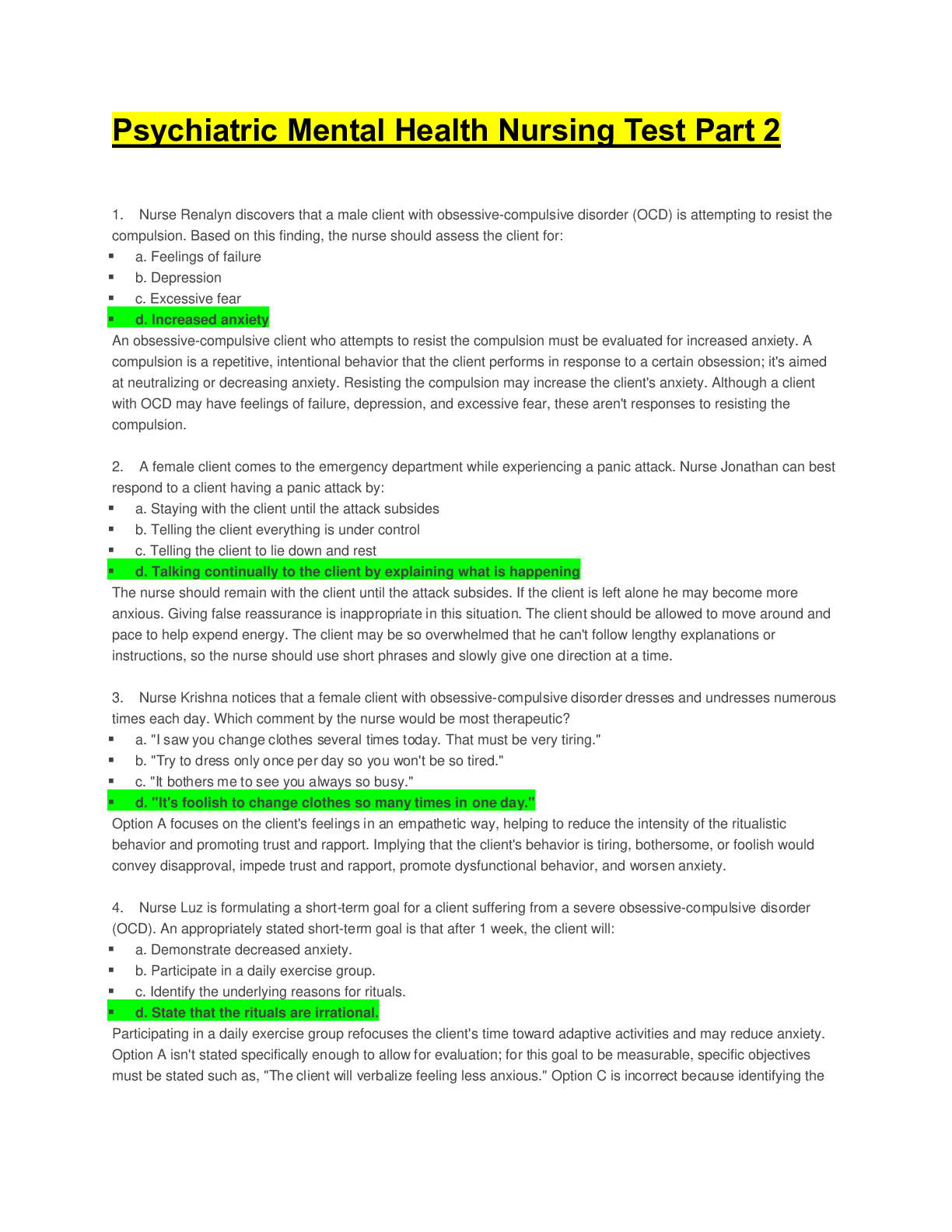
Reviews( 0 )
Document information
Connected school, study & course
About the document
Uploaded On
Mar 15, 2020
Number of pages
7
Written in
Additional information
This document has been written for:
Uploaded
Mar 15, 2020
Downloads
0
Views
46

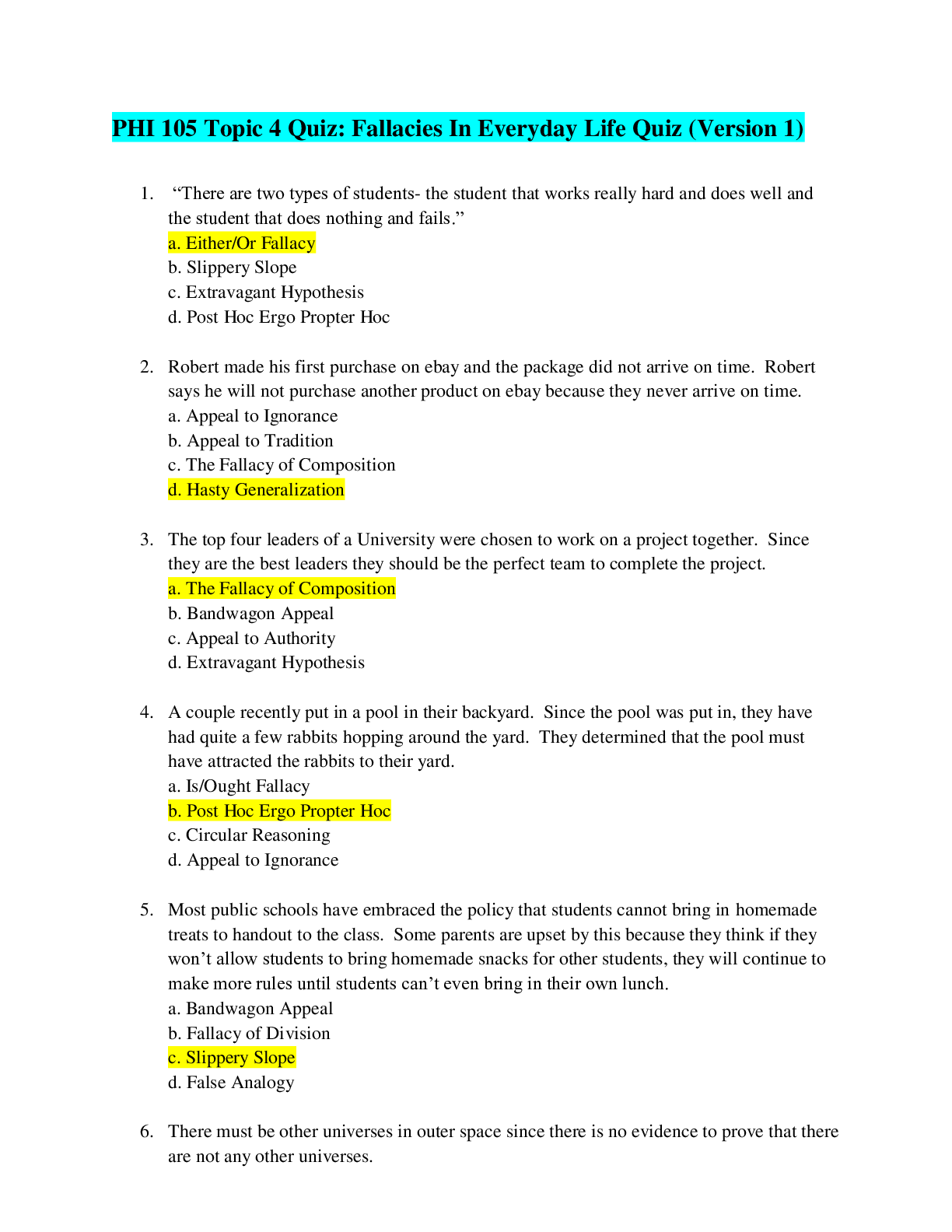

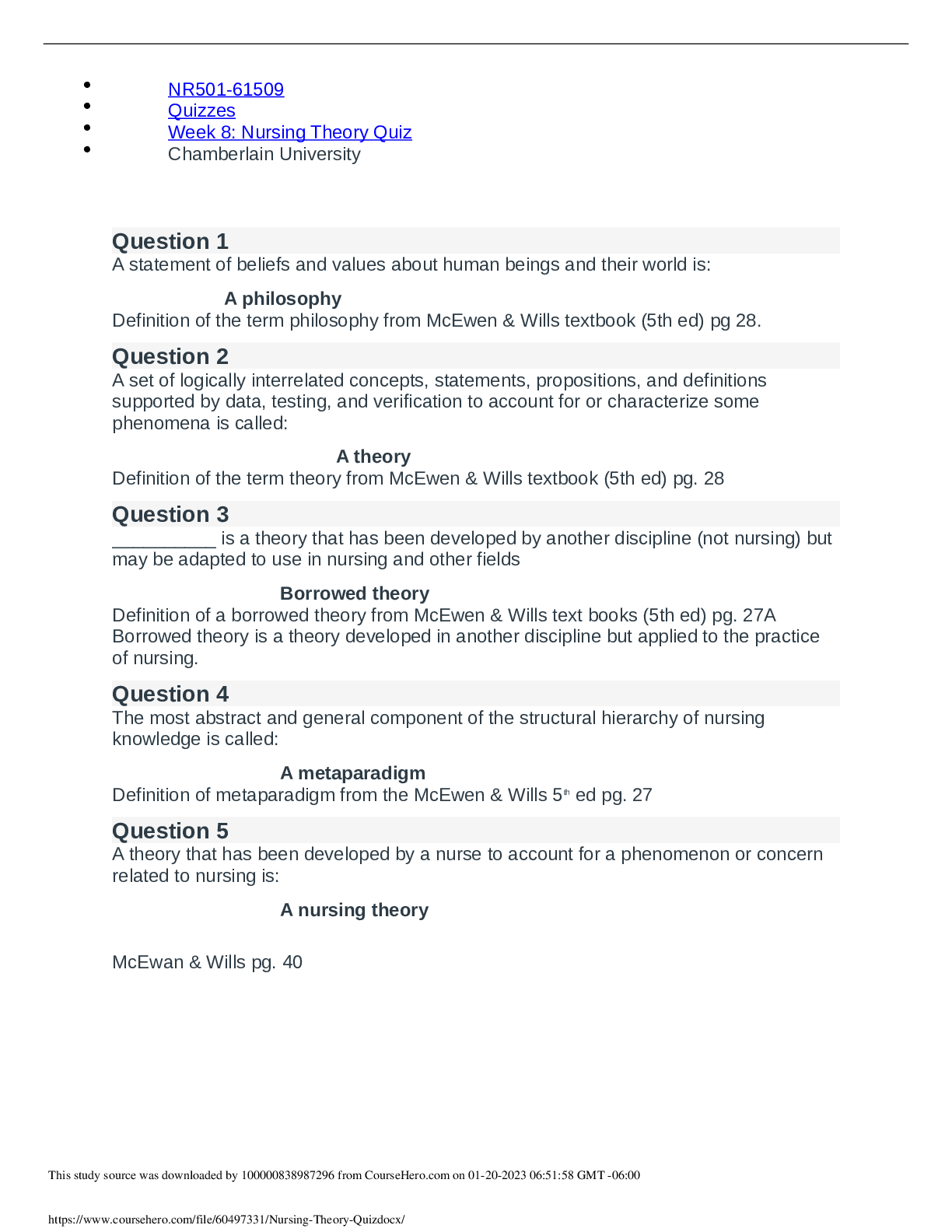
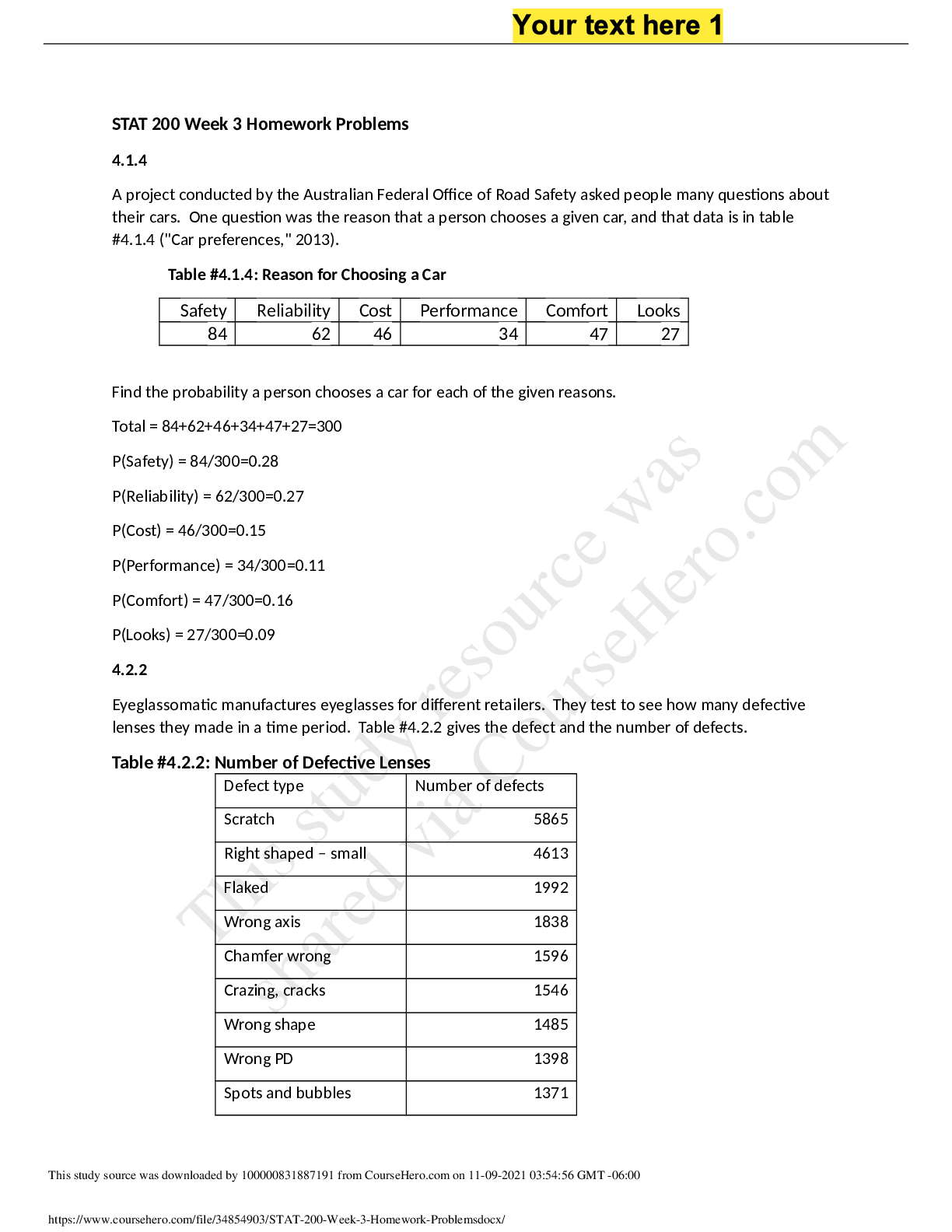
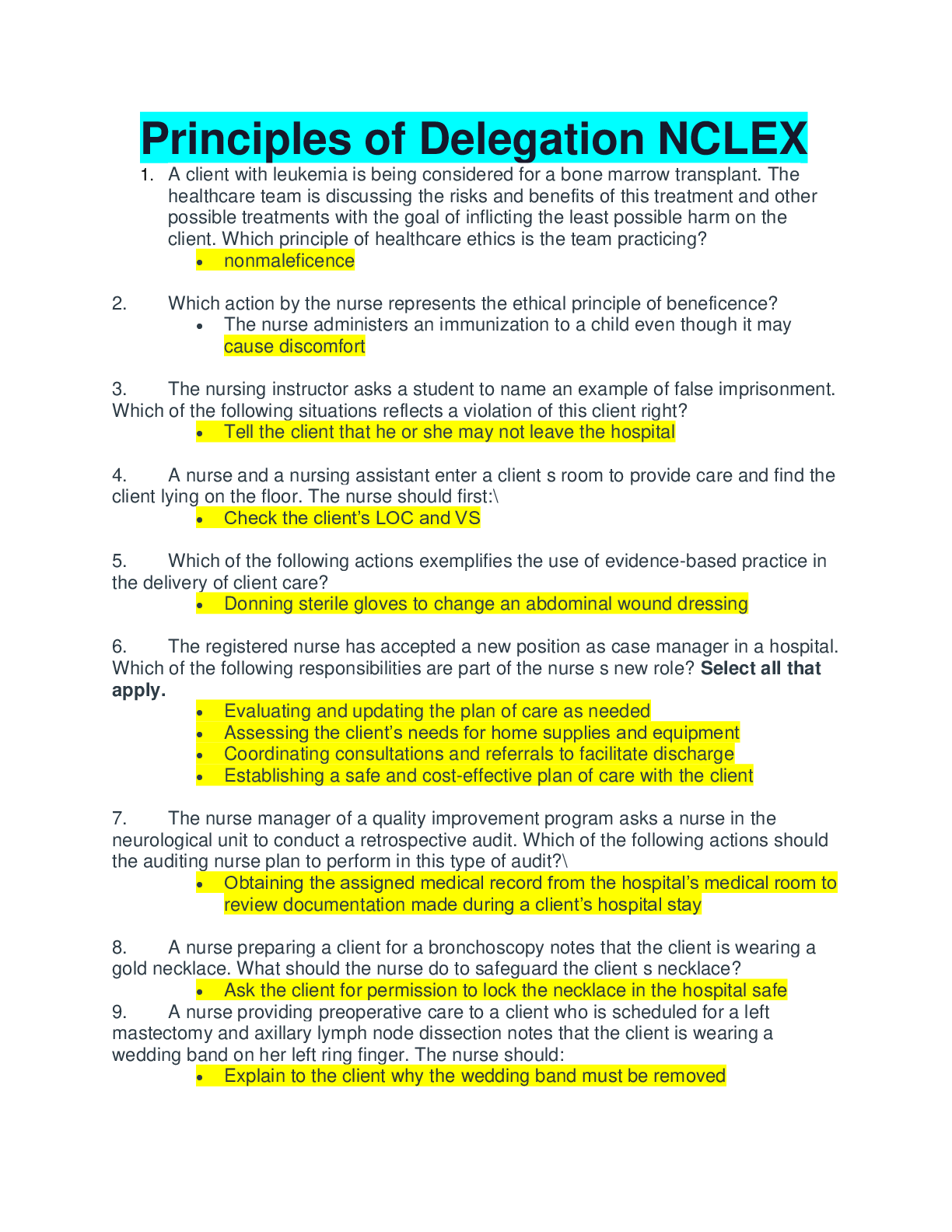
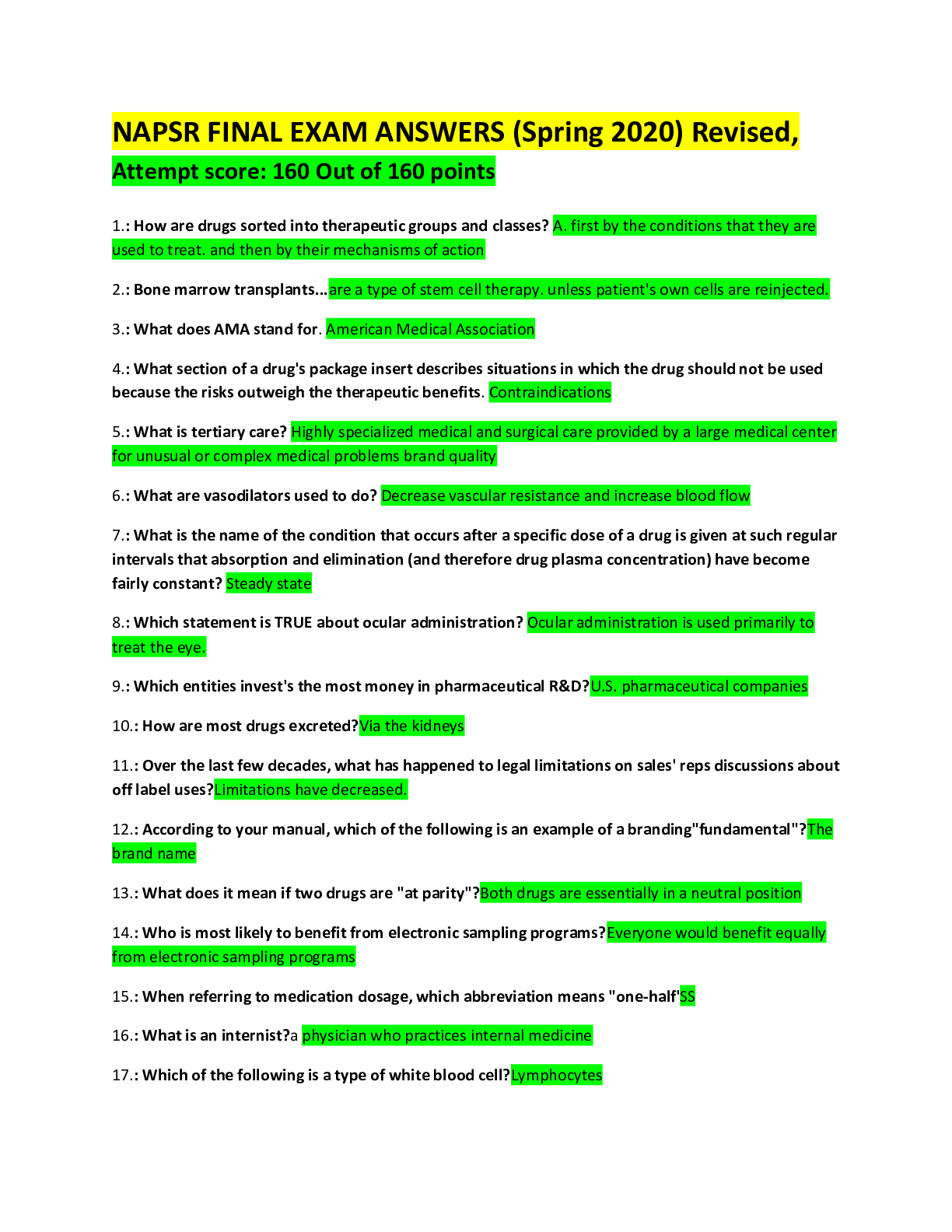
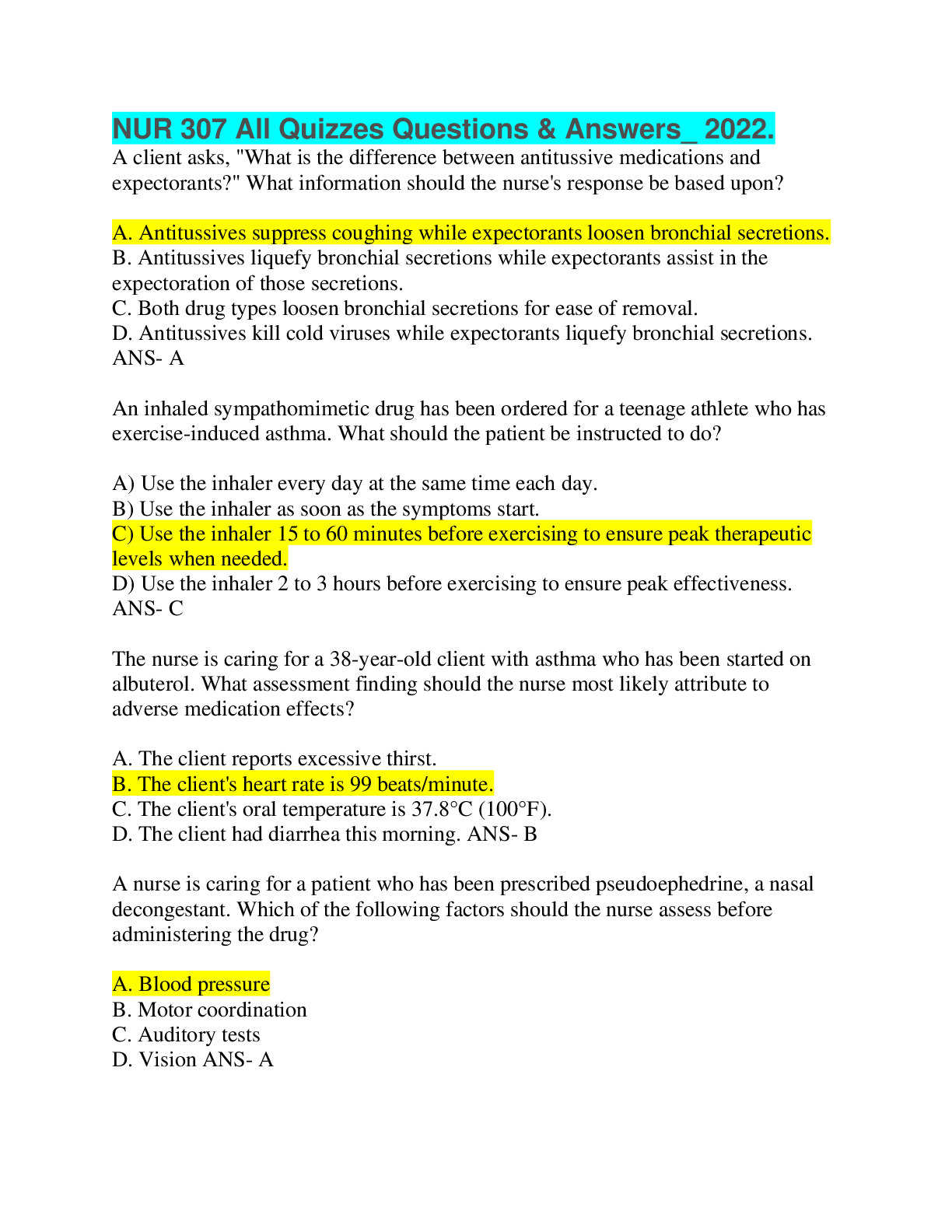
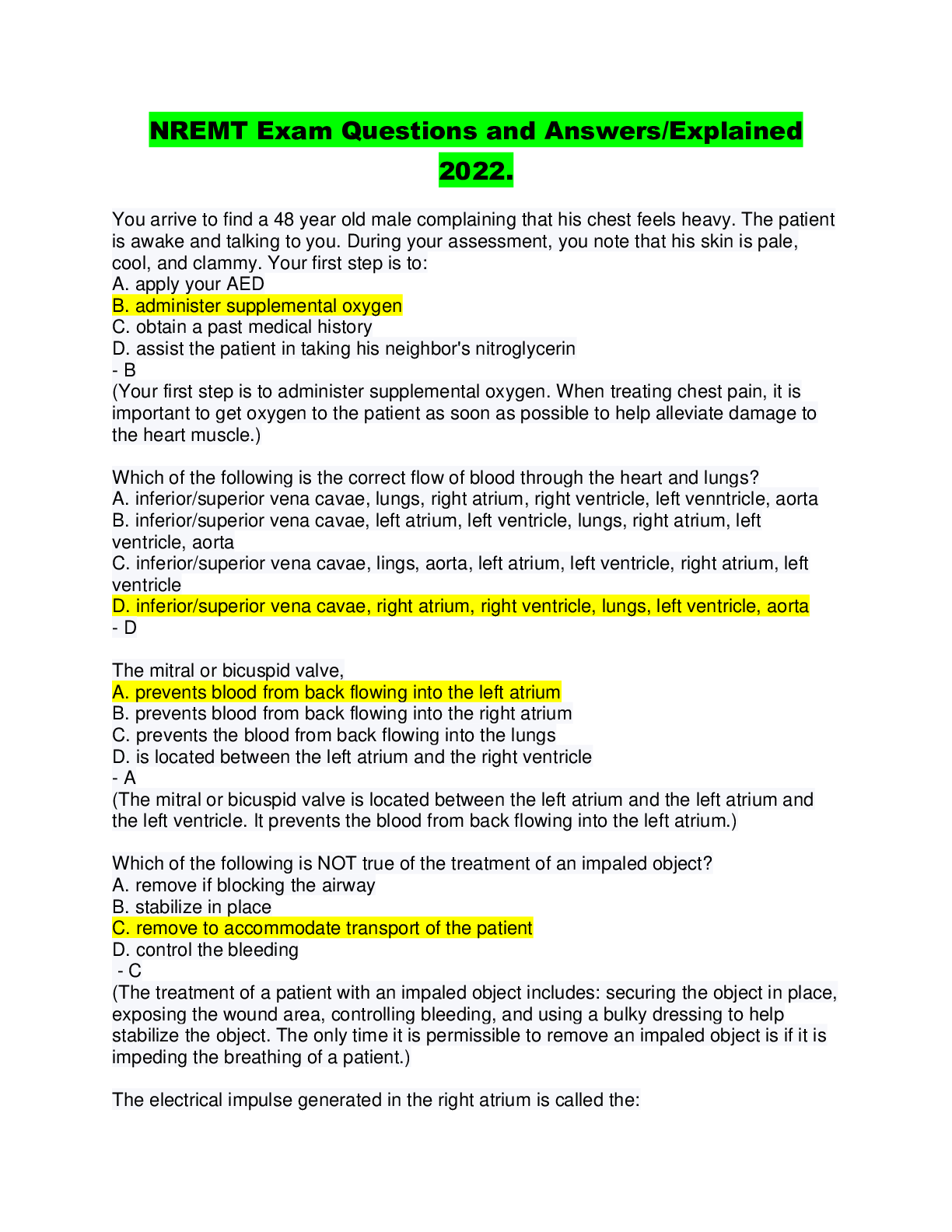
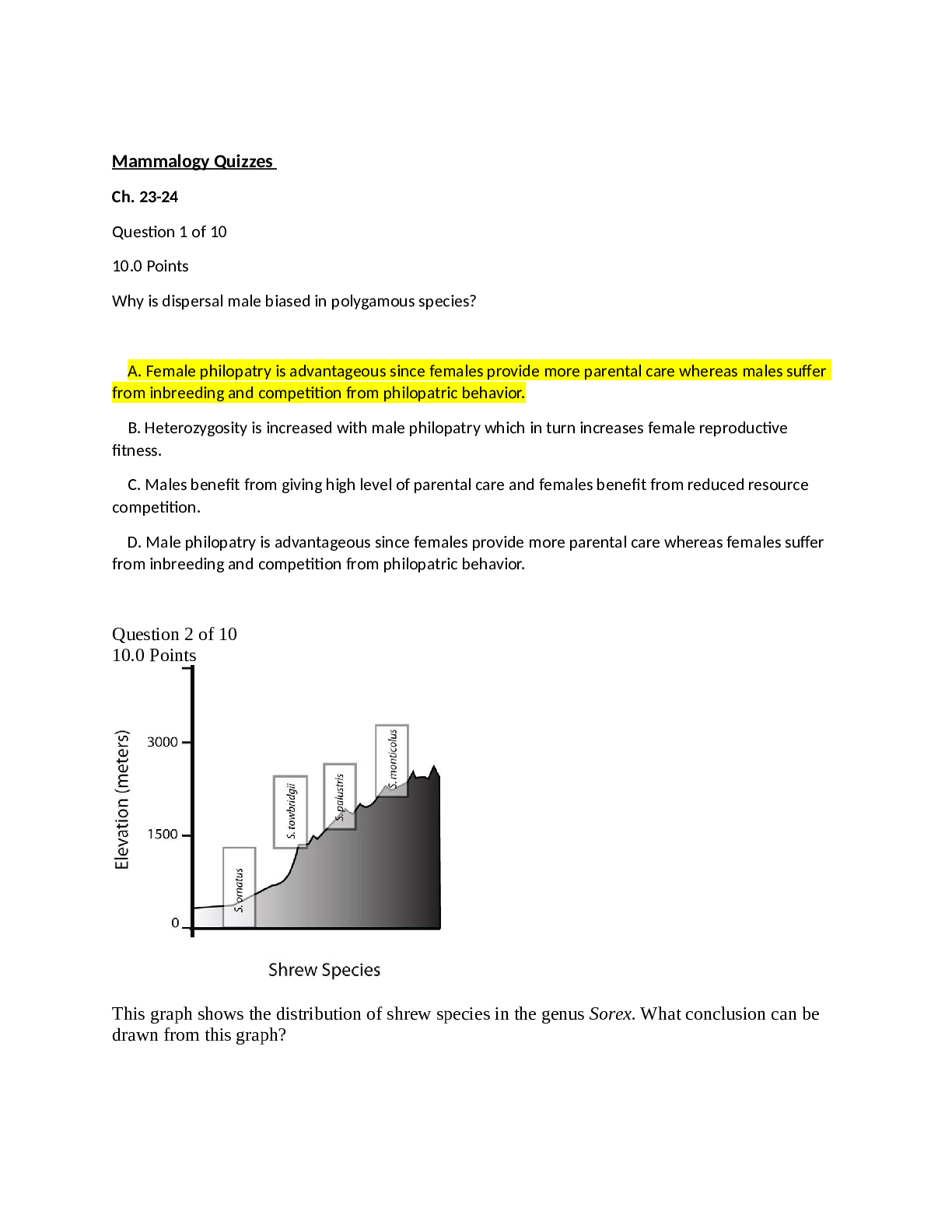
.png)
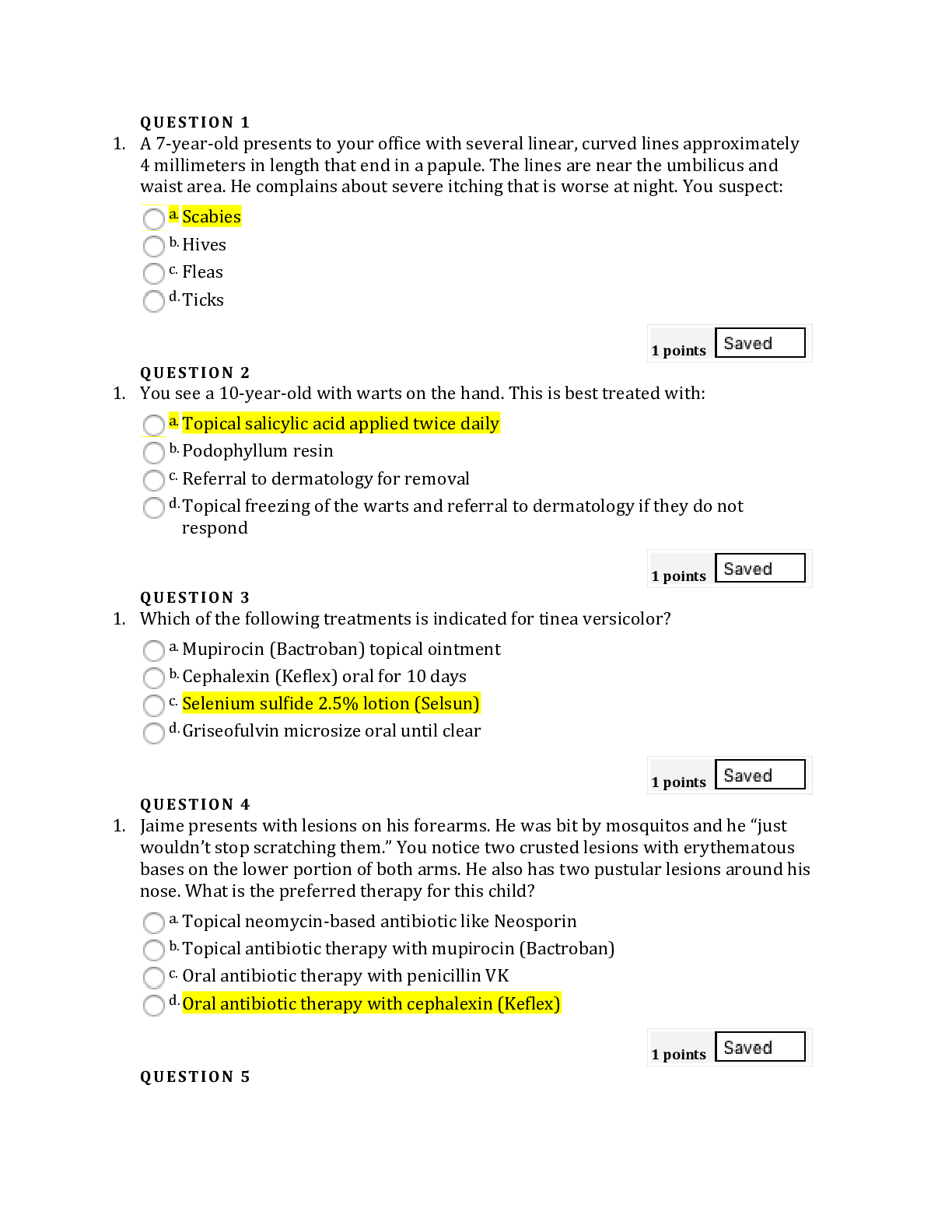
.png)

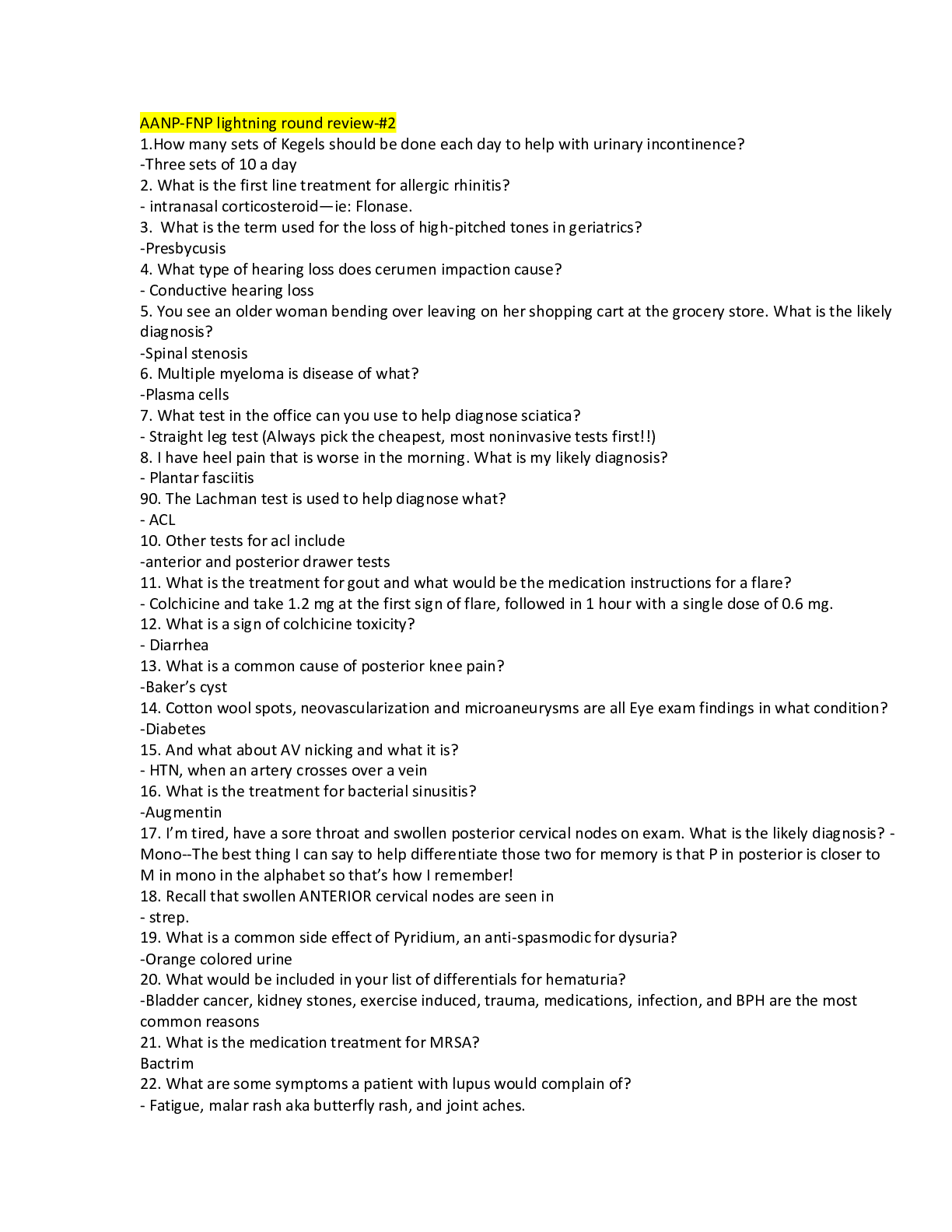
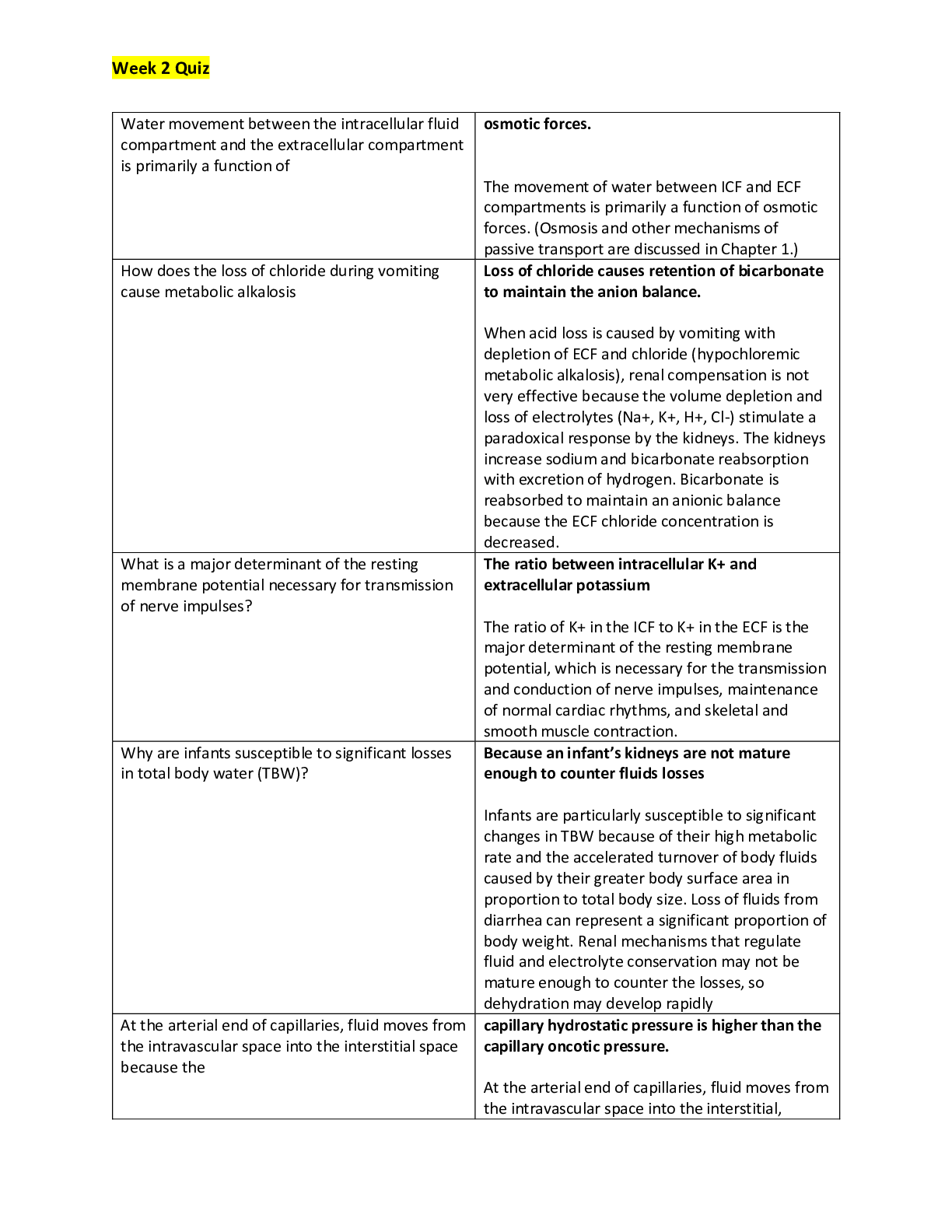
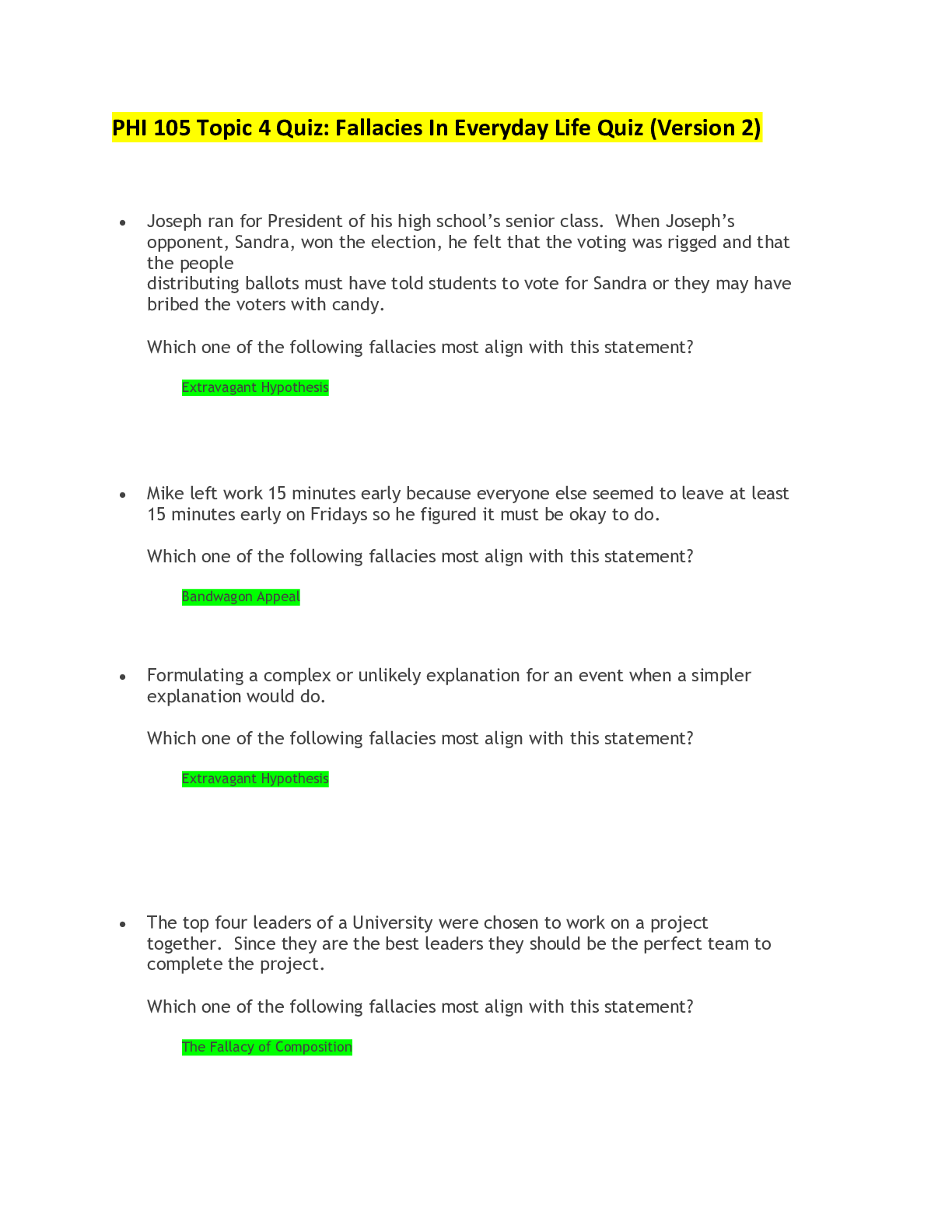
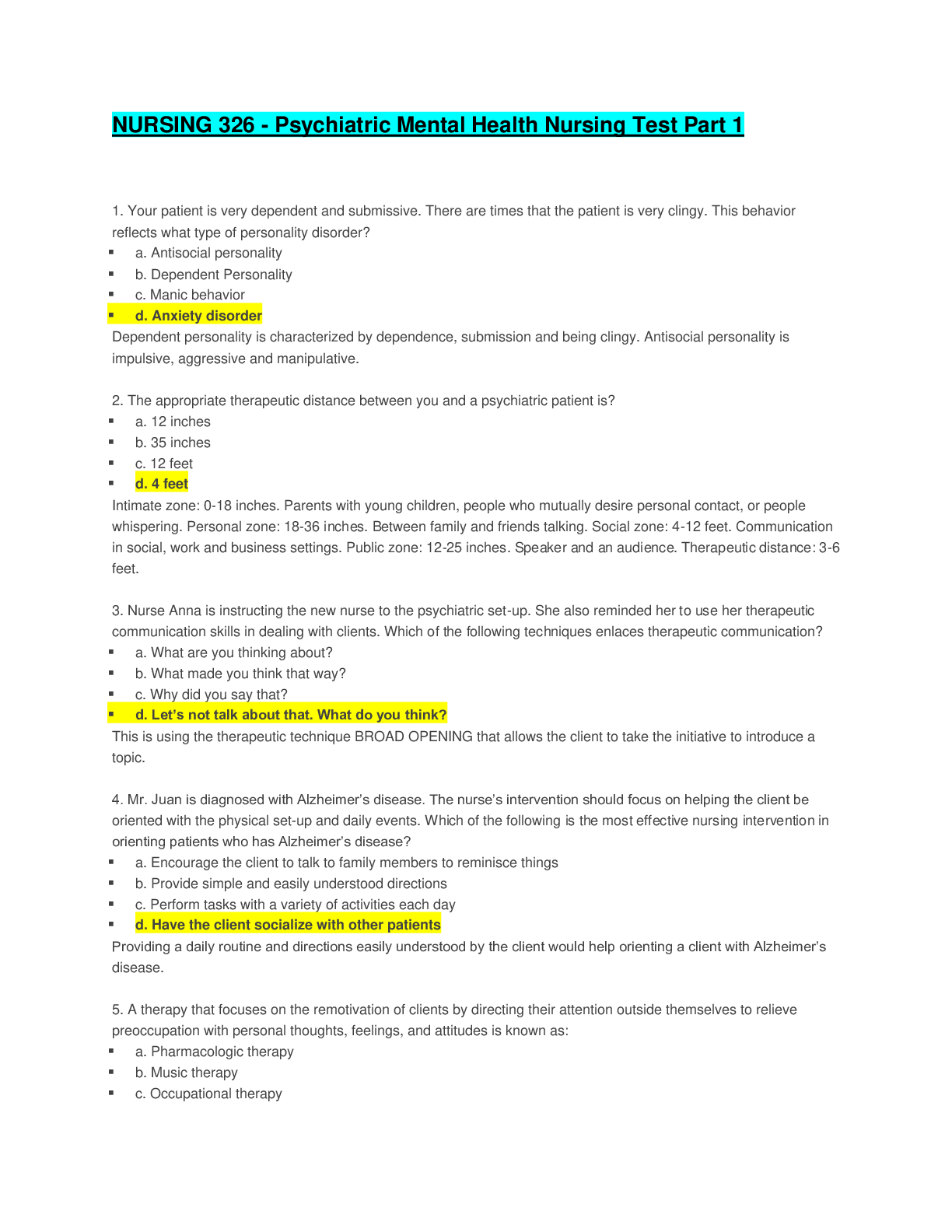
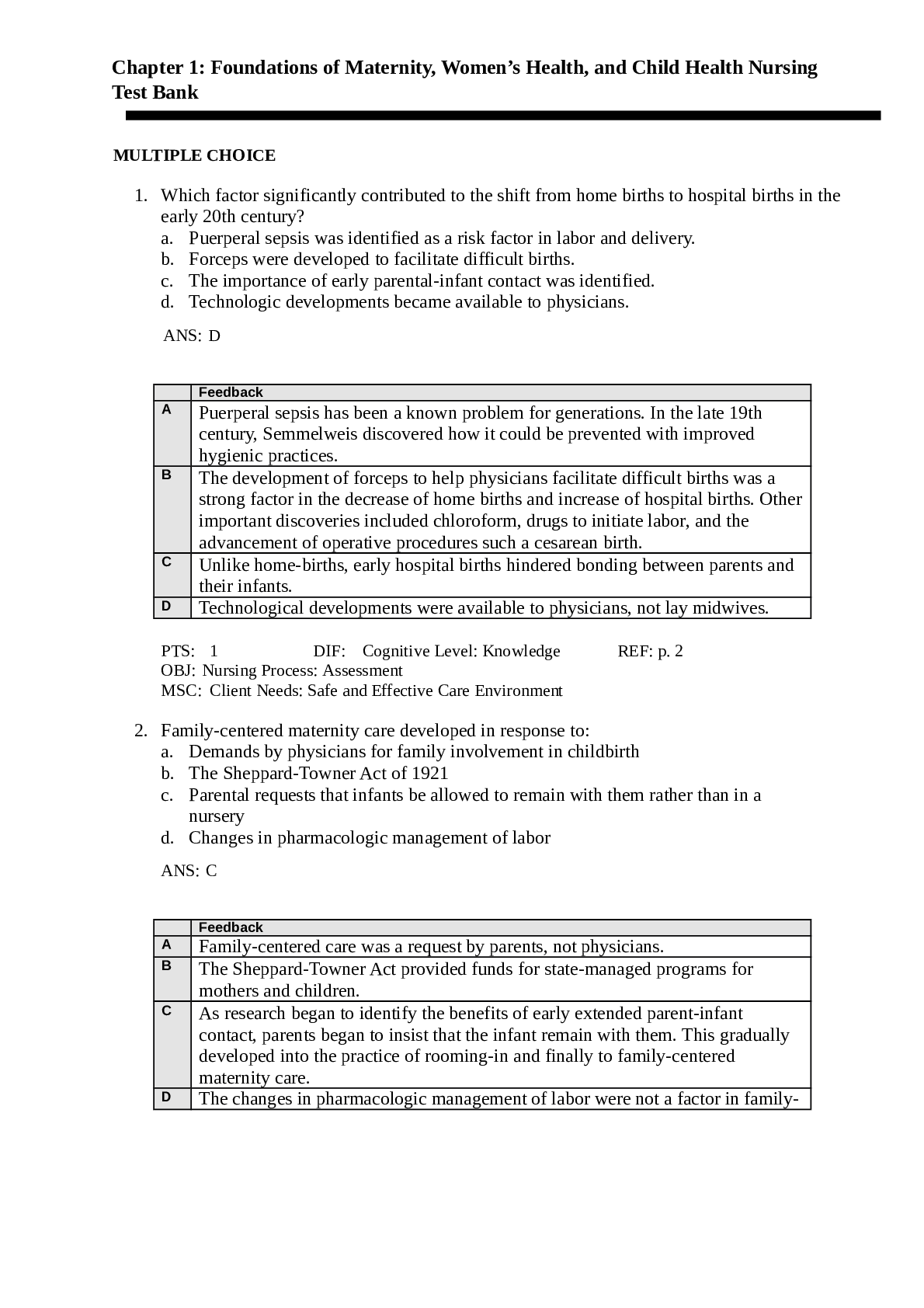
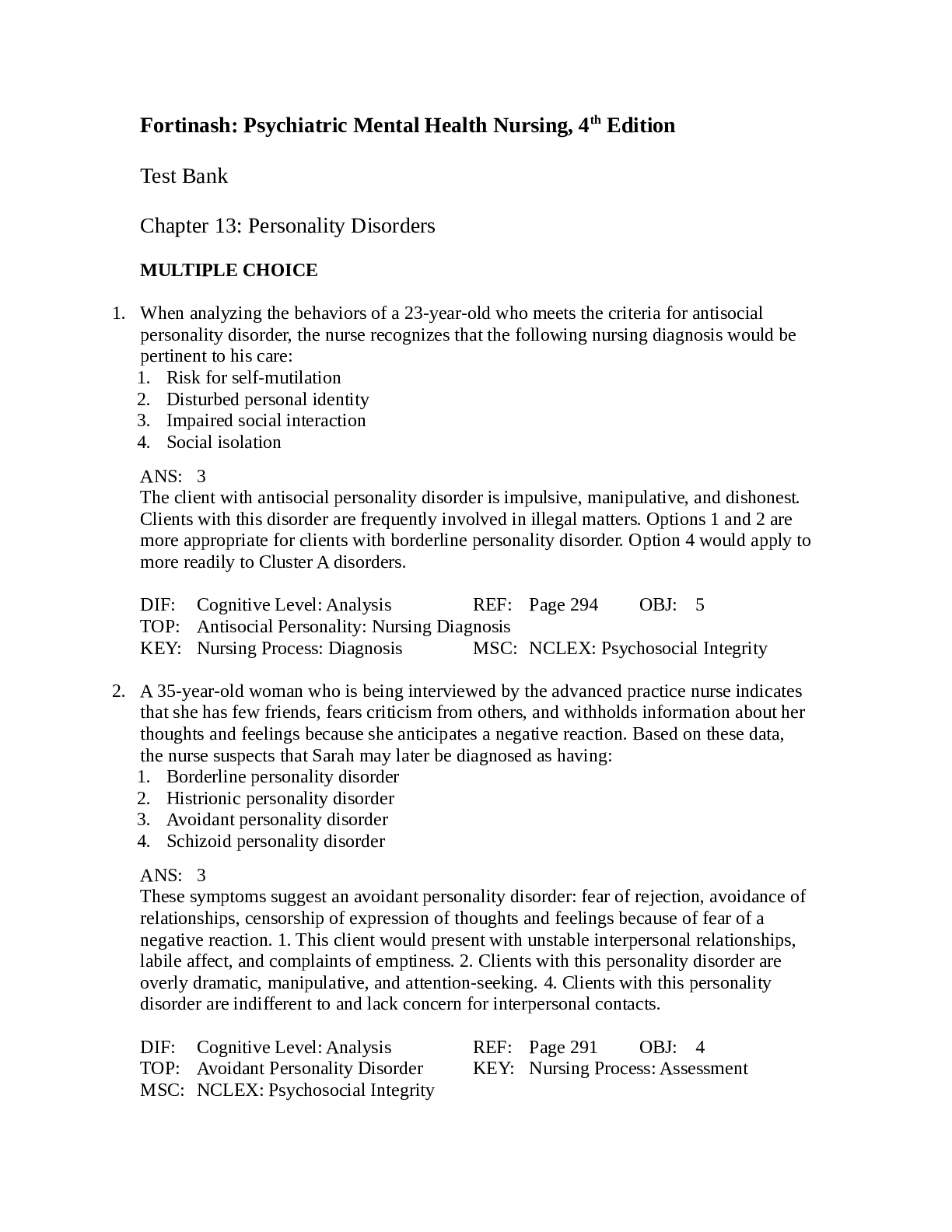
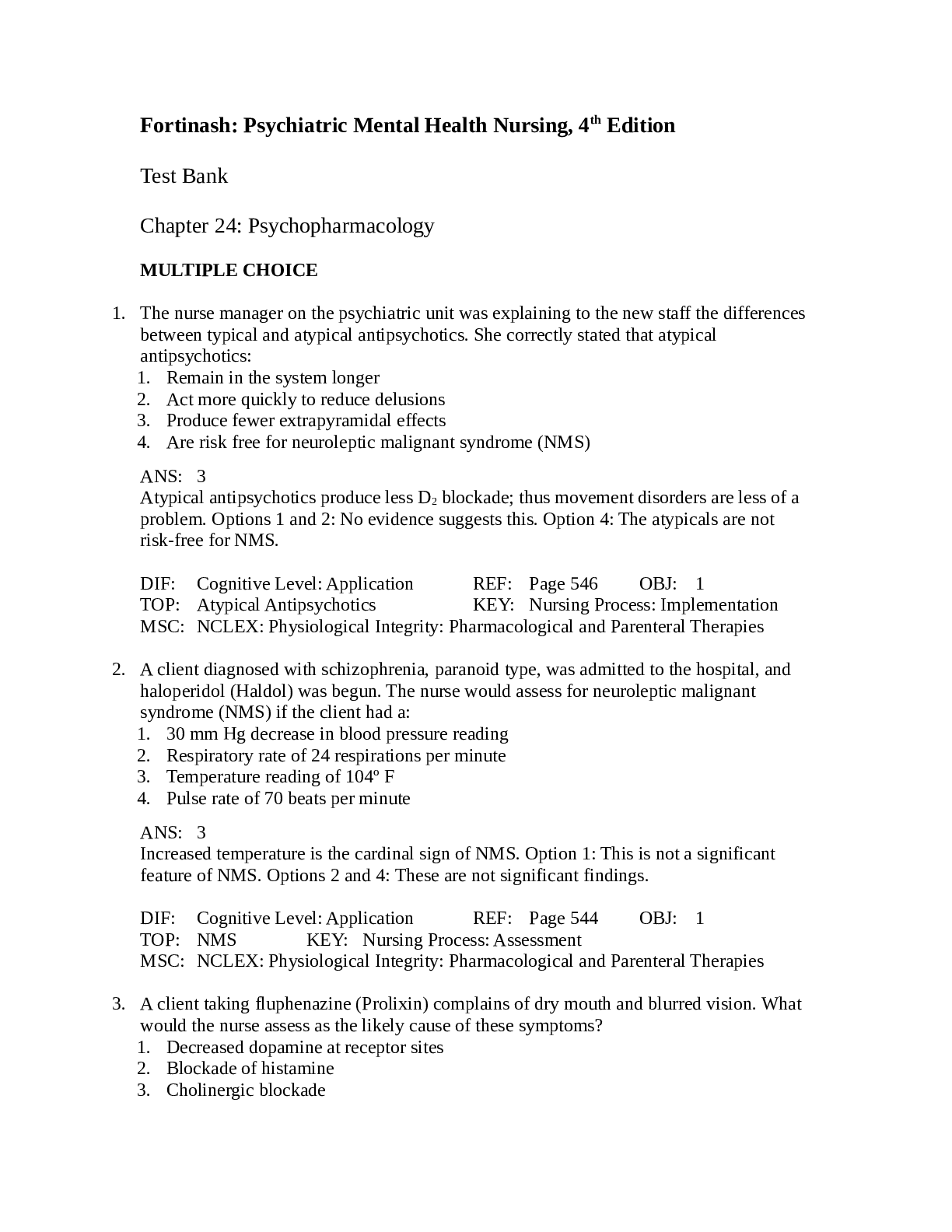
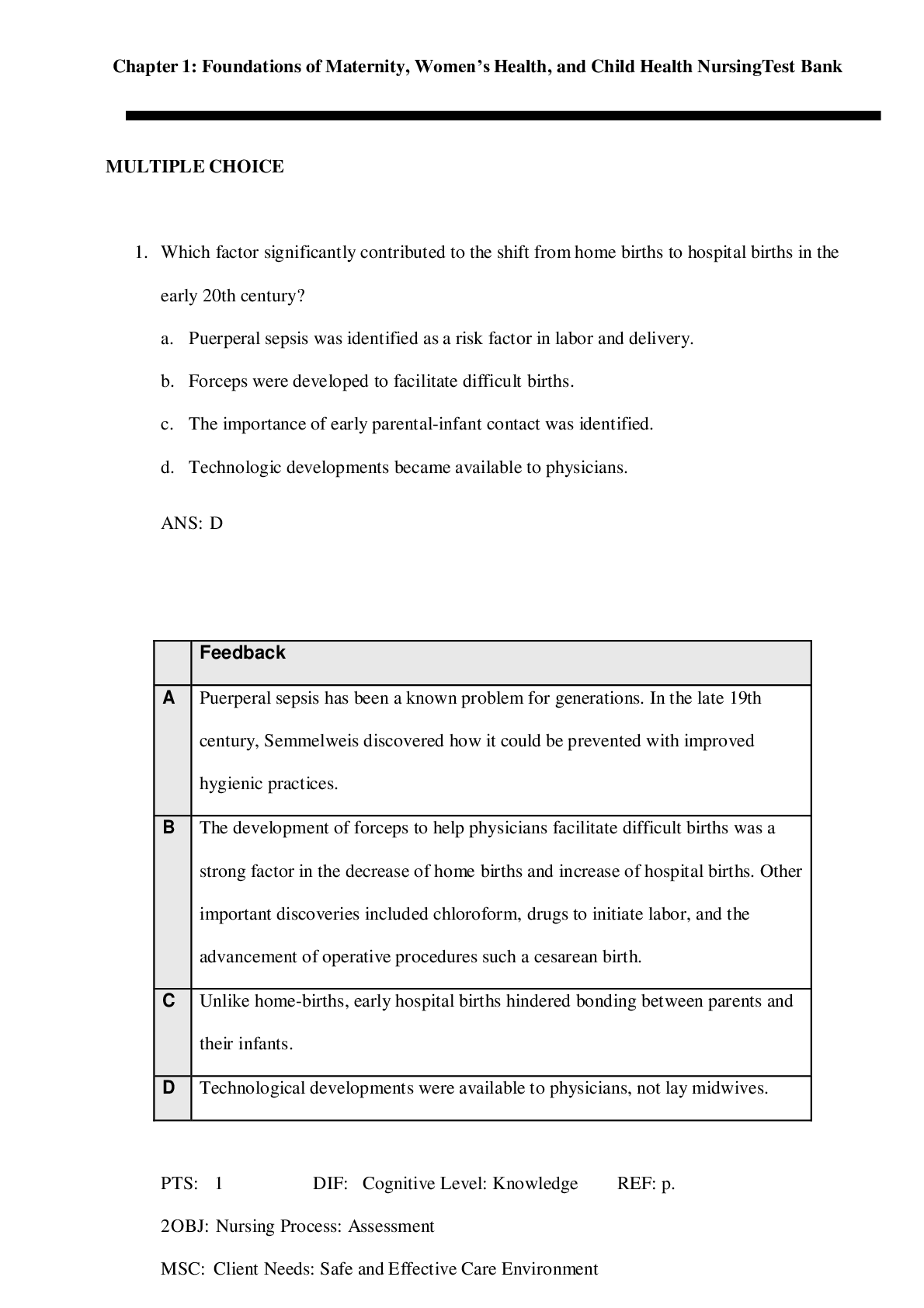

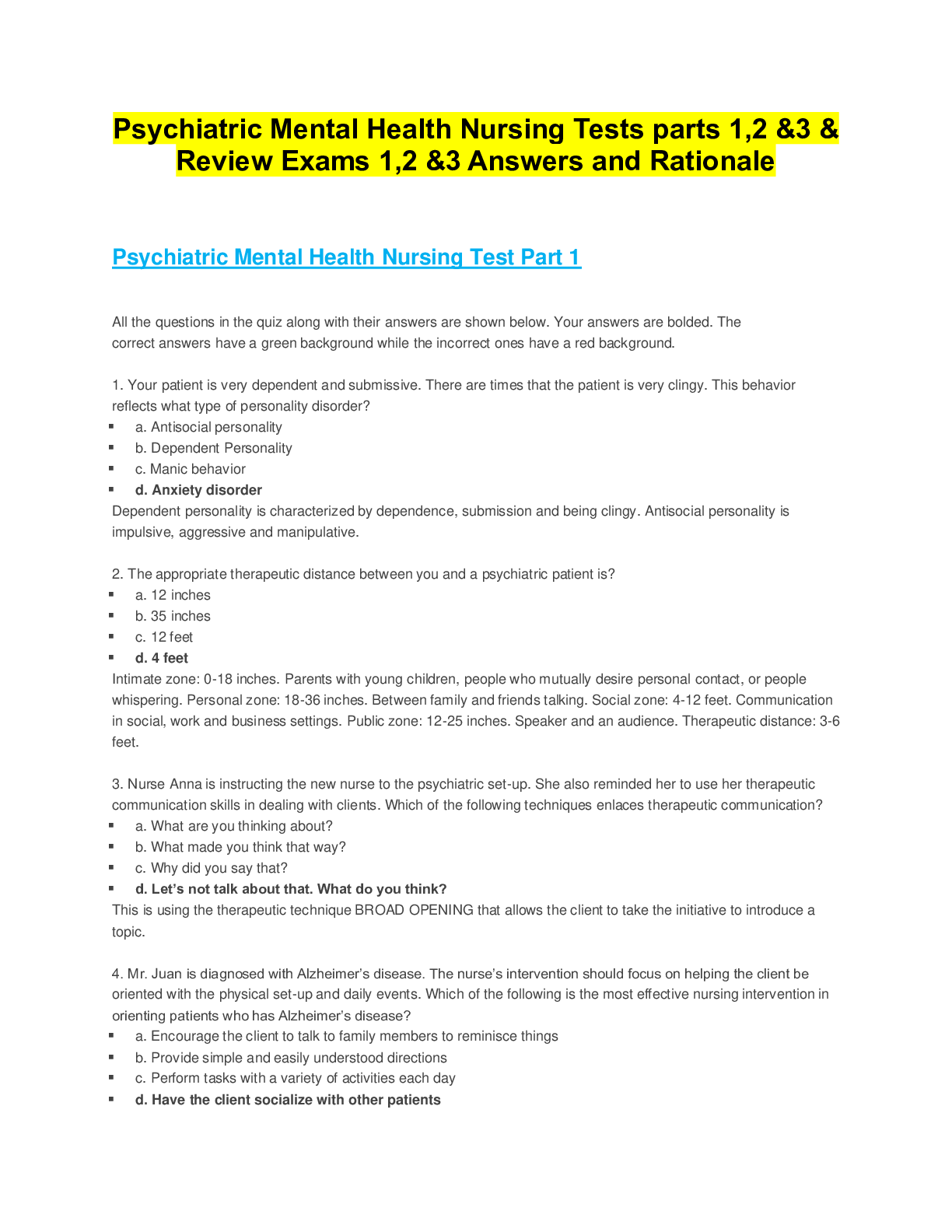
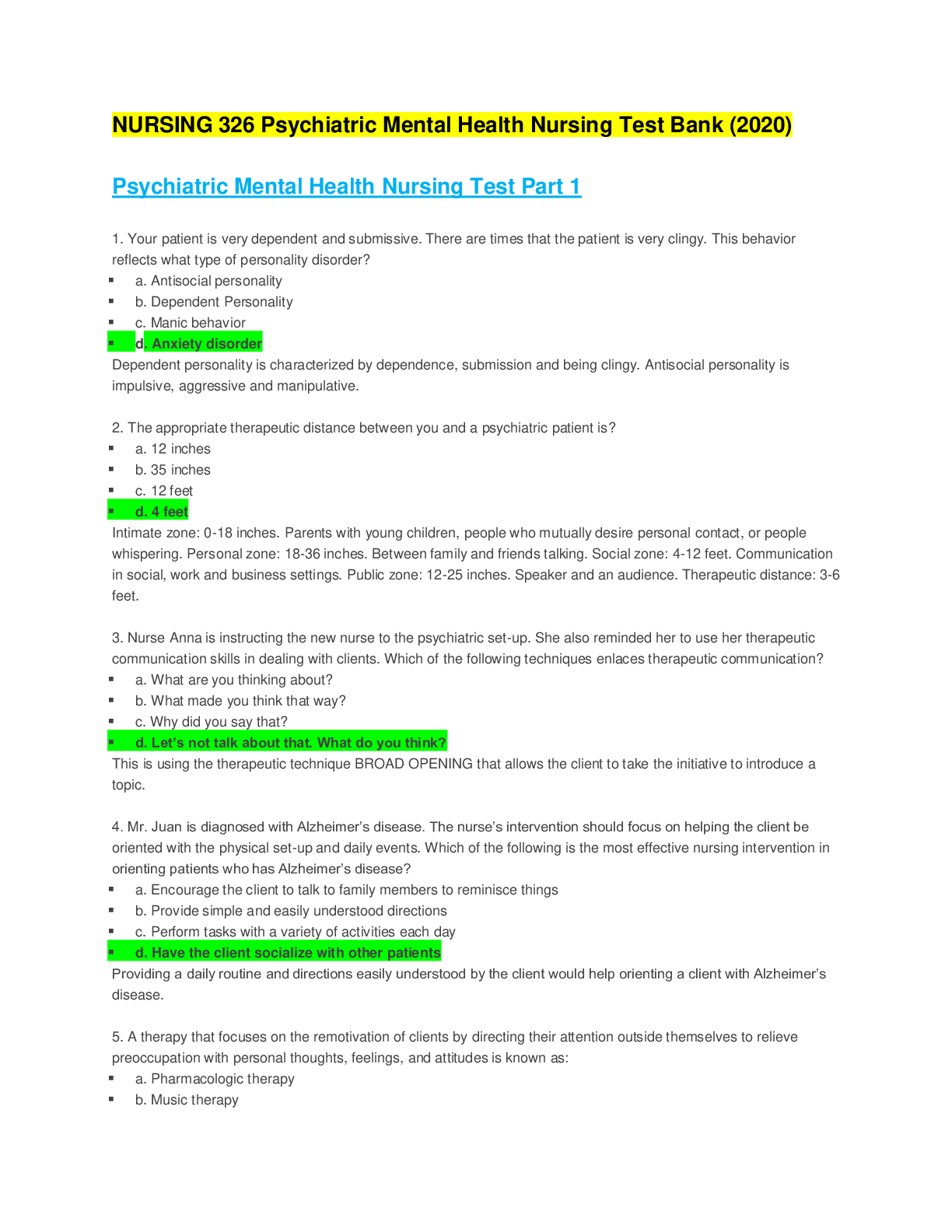
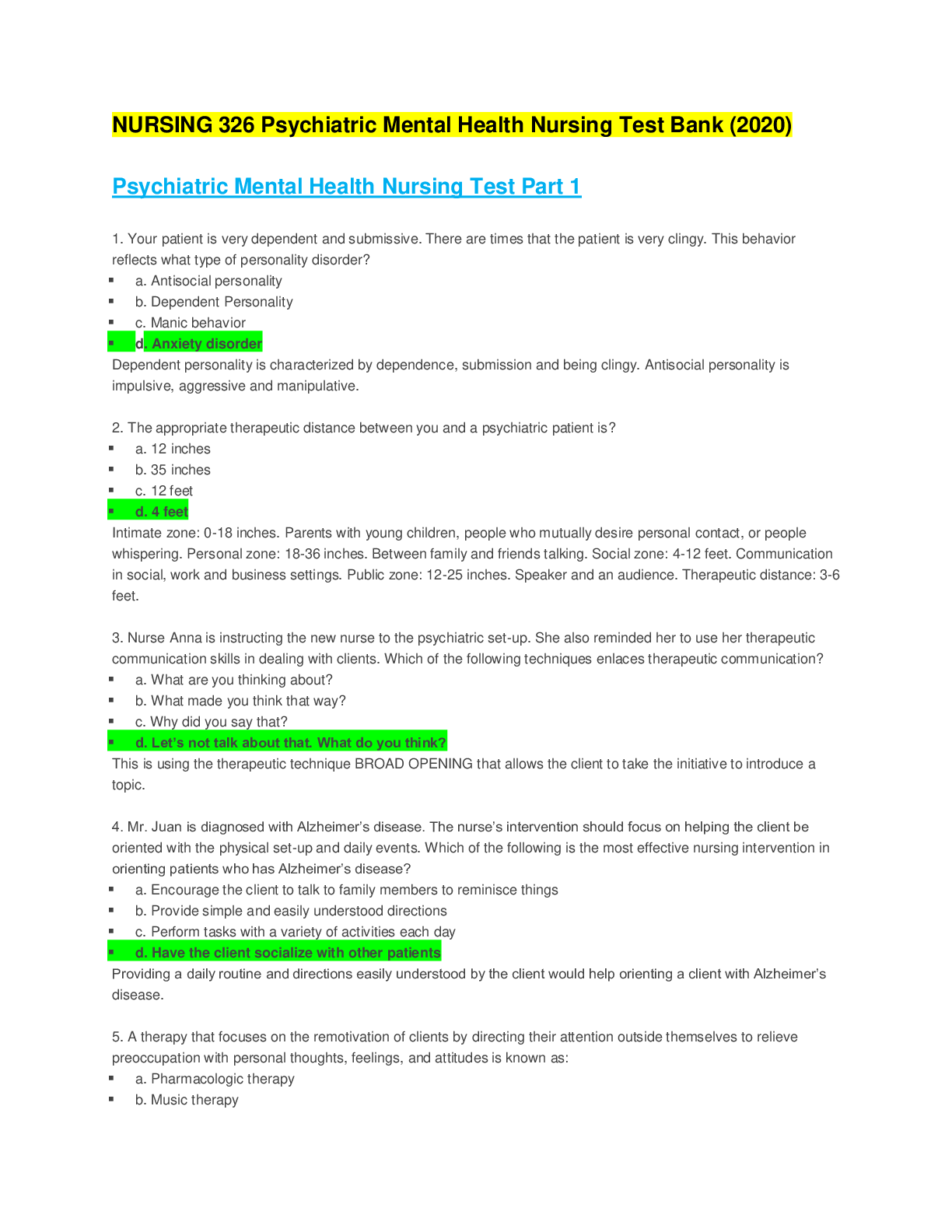
 (1).png)



